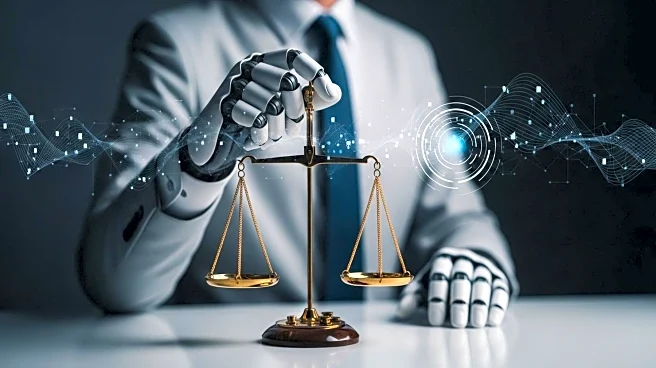What is the story about?
What's Happening?
The legal industry is increasingly integrating generative artificial intelligence into its operations, prompting a demand for law schools to incorporate AI education into their curricula. According to Bloomberg Law's Path to Practice Survey for the 2024-2025 school year, there is a notable gap between industry expectations and the educational offerings of law schools. While 46% of lawyers reported using AI for work tasks, nearly 80% believe law students should be trained in AI technologies. Despite this, law schools have reduced their AI course offerings, with only 51% of faculty reporting classes on AI's legal implications, down from previous years. Additionally, student participation in AI courses remains low, with only 9% engaging in legal technology courses.
Why It's Important?
The disconnect between law schools and the legal industry's demand for AI proficiency could have significant implications for the future workforce. As AI becomes more integral to legal practices, law graduates may find themselves underprepared for the technological demands of their profession. This gap could affect the competitiveness of U.S. law schools and their graduates in the global market. Furthermore, the slow adaptation of AI education in law schools may hinder the industry's ability to fully leverage AI's potential, impacting efficiency and innovation within legal services.
What's Next?
Law schools may need to accelerate their integration of AI into standard curricula to better prepare students for the evolving demands of the legal industry. This could involve expanding AI-related courses and encouraging student participation. As technological advancements continue, there may be increased pressure from both industry leaders and students for law schools to adapt more rapidly. The upcoming 2025-2026 school year could see significant changes in AI education offerings as schools strive to align with industry needs.
Beyond the Headlines
The slow pace of AI integration in law schools raises questions about the broader educational system's ability to adapt to technological changes. This situation highlights potential ethical considerations regarding the preparedness of future professionals and the responsibility of educational institutions to equip students with relevant skills. Additionally, the disparity in AI education may reflect broader challenges in academia's responsiveness to industry trends.















